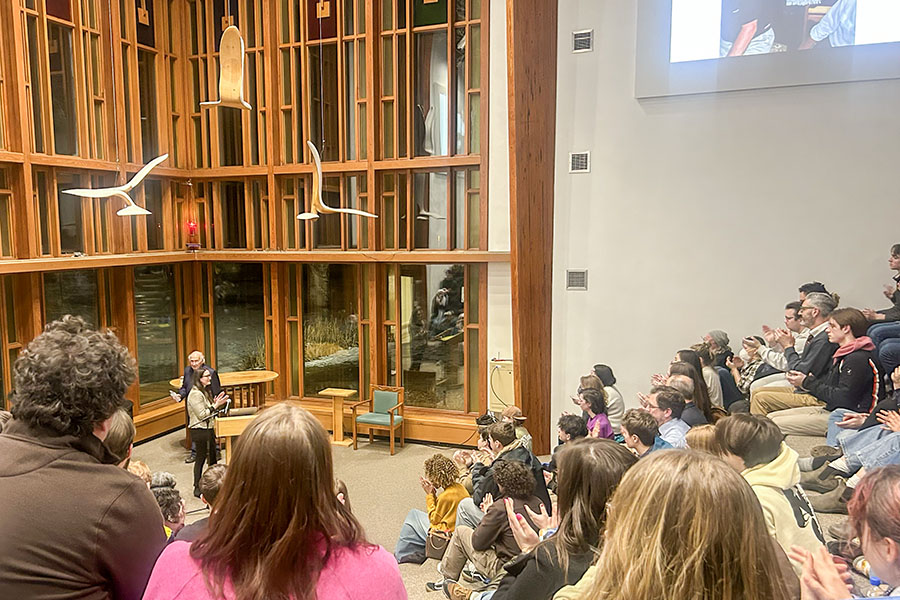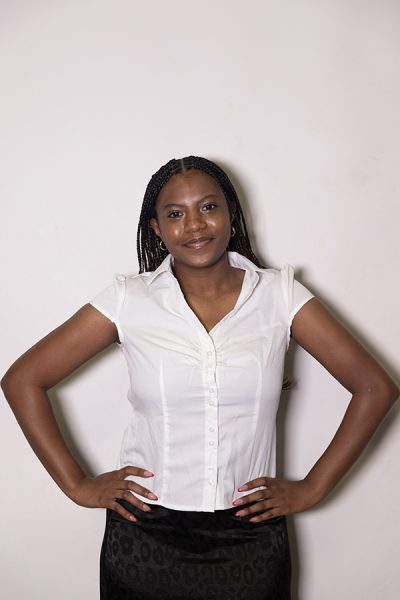Ithaca College Hillel hosted a talk with Holocaust survivor Roald Hoffmann on Jan. 27, International Holocaust Remembrance Day. Nearly 200 people filled the narrow seats of Muller Chapel to hear Hoffmann share his experiences as a young boy during the genocide.
Hoffmann is the Frank H. T. Rhodes professor of Humane Letters Emeritus at Cornell University and won a Nobel Prize for Chemistry in 1981. He grew up in Złoczów, Poland, a town now known as Zolochiv, located in Western Ukraine. The town was occupied by Nazi Germany between July 2, 1941, and July 18, 1944. The attacks on the Jewish population in the town began immediately. One of the victims of these attacks included Hoffmann’s grandfather.
In his talk, Hoffmann explained how he lived his life before the invasion. He talked about his life in Poland through different phases of occupation, from the Nazi regime to the Soviet Union.
“I’m very proud to be here [in America],” Hoffmann said. “And [for] my family [and I] too have benefited from America’s gifts to us.”
Hoffmann said the ethnic struggles in his hometown had started with the town’s occupation under the Soviet Union and how that influenced Nazi Germany’s invasion.
“The Soviets as they occupied that part of Poland, they viewed the Ukrainians as nationalist agitators for a free and independent Ukraine,” Hoffmann said. “The result was that they persecuted the Ukrainian population.”
Hoffmann explained that when the Nazis invaded the Soviets in 1941, instead of fighting the Ukrainians, they took their time to kill them. He said that Ukrainians were resentful of their mass persecution by the Soviets and viewed the Nazis as their allies — resulting in many Ukrainians outing people as Jewish when his town was invaded by the Nazis.
During the first year, Hoffmann and his mother were moved 30 miles away from their home to a labor camp, which he said held about 300 people.
“There were no [barbed] wires,” Hoffmann said. “There were 30 or so armed guards who came from every ethnic group that collaborated with the Nazis. … The guards: some were benevolent, some were satanists — they all could be bribed. … Those gold coins meant the difference between life and death.”
Hoffmann said that he and his mother fled from the camp in 1942 once it became clear that people were being sent to extermination camps. They looked for community members who could hide them, as many Jewish people did after fleeing from camps. In January 1943, his family found a person who was willing to hide them.
“This Ukrainian school teacher in a small village of about 50 houses — he agreed to hide [my family],” Hoffmann said. “Initially two of us, but then it grew to four and five.”
They went out of hiding in 1944 when the Soviet Union began liberating parts of eastern Poland. The Soviet Army began Operation Bagration, which aimed to get Nazi German forces out of the Soviet Union and Eastern Europe; it was launched in support of the Normandy Invasion. The Soviet Union freed Hoffmann in 1944.
“[In] June 1944, American soldiers and others were dying on the beaches of Normandy,” Hoffmann said. “But for us, the war was over. We were freed by the forces of evil, things are not bold and clear in the context, as we would sometimes like them to be.”
In 1949, Hoffmann emigrated to the U.S.
“I am in the last generation of Hitler’s gifts to America,” Hoffmann said. “It’s one way to say this in the context of [the] present immigration policy — we contributed a lot to this country.”
Senior Lilli Zimmerman, who attended the talk, said the school is very fortunate to be able to hear from and speak with Hoffmann because there are not many Holocaust survivors still alive.
“I am a fellow Jewish student myself and I decided to come to this event because we’re very fortunate to [speak with] someone who lived through the horrific times of Judaism,” Zimmerman said. “We should take advantage of any opportunity we have to learn.”
Senior Rafe Navarro said he came to the event because he felt like he had a moral obligation.
“It just felt like the right thing for me to do,” Navarro said. “I wanted to pay my respects, learn some perspectives about the Holocaust from someone who lived through that event, meet someone and learn their stories and maybe tell them to other people that may be interested.”
Zimmerman said that attending the talk made her feel grateful for the life she has.
“[The talk] was very heartwarming, yet sad and heartbreaking,” Zimmerman said. “It personally made me feel that I need to stop taking the things for granted I have in my daily life, such as a shower, breakfast, lunch, dinner.”
At the end of his talk, Hoffmann reflected on how his family and the family that hid him continued to stay in contact and how they are forever bonded — one way they stayed connected was by sending packages to each other. On a visit to Ukraine the family showed him an embroidered cloth his mother sent them.
“[The embroidery] is much more than just a piece of cloth. It’s a sign of a bond between the families that was sealed in difficult times and remains such,” Hoffmann said. “There’s more to tell you, but I think I’ve given witness sufficiently. We must remember those times to hear these stories again. Thank you.”















